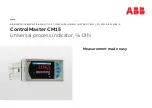
406
XMEGA B [DATASHEET]
8291B–AVR–01/2013
Register Description – Power Reduction . . . . . . . . . . . . . . . . . . . . . . . . . . . 101
Register Summary - Power Reduction . . . . . . . . . . . . . . . . . . . . . . . . . . . . . 104
10. WDT – Watchdog Timer . . . . . . . . . . . . . . . . . . . . . . . . . . . . . . . . 113
10.1 Features . . . . . . . . . . . . . . . . . . . . . . . . . . . . . . . . . . . . . . . . . . . . . . . . . . . . 113
10.2 Overview . . . . . . . . . . . . . . . . . . . . . . . . . . . . . . . . . . . . . . . . . . . . . . . . . . . . 113
10.3 Normal Mode Operation . . . . . . . . . . . . . . . . . . . . . . . . . . . . . . . . . . . . . . . . 113
10.4 Window Mode Operation. . . . . . . . . . . . . . . . . . . . . . . . . . . . . . . . . . . . . . . . 114
10.5 Watchdog Timer Clock . . . . . . . . . . . . . . . . . . . . . . . . . . . . . . . . . . . . . . . . . 114
10.6 Configuration Protection and Lock . . . . . . . . . . . . . . . . . . . . . . . . . . . . . . . . 114
10.7 Registers Description . . . . . . . . . . . . . . . . . . . . . . . . . . . . . . . . . . . . . . . . . . 115
10.8 Register Summary . . . . . . . . . . . . . . . . . . . . . . . . . . . . . . . . . . . . . . . . . . . . 117
11. Interrupts and Programmable Multilevel Interrupt Controller . . . . . 118
11.1 Features . . . . . . . . . . . . . . . . . . . . . . . . . . . . . . . . . . . . . . . . . . . . . . . . . . . . 118
11.2 Overview . . . . . . . . . . . . . . . . . . . . . . . . . . . . . . . . . . . . . . . . . . . . . . . . . . . . 118
11.3 Operation . . . . . . . . . . . . . . . . . . . . . . . . . . . . . . . . . . . . . . . . . . . . . . . . . . . 118
11.4 Interrupts . . . . . . . . . . . . . . . . . . . . . . . . . . . . . . . . . . . . . . . . . . . . . . . . . . . . 119
11.5 Interrupt level . . . . . . . . . . . . . . . . . . . . . . . . . . . . . . . . . . . . . . . . . . . . . . . . 121
11.6 Interrupt priority . . . . . . . . . . . . . . . . . . . . . . . . . . . . . . . . . . . . . . . . . . . . . . . 121
11.7 Interrupt vector locations. . . . . . . . . . . . . . . . . . . . . . . . . . . . . . . . . . . . . . . . 123
11.8 Register Description . . . . . . . . . . . . . . . . . . . . . . . . . . . . . . . . . . . . . . . . . . . 124
11.9 Register Summary . . . . . . . . . . . . . . . . . . . . . . . . . . . . . . . . . . . . . . . . . . . . 125
12.1 Features . . . . . . . . . . . . . . . . . . . . . . . . . . . . . . . . . . . . . . . . . . . . . . . . . . . . 126
12.2 Overview . . . . . . . . . . . . . . . . . . . . . . . . . . . . . . . . . . . . . . . . . . . . . . . . . . . . 126
12.3 I/O Pin Use and Configuration . . . . . . . . . . . . . . . . . . . . . . . . . . . . . . . . . . . 127
12.4 Reading the Pin Value . . . . . . . . . . . . . . . . . . . . . . . . . . . . . . . . . . . . . . . . . 131
12.5 Input Sense Configuration. . . . . . . . . . . . . . . . . . . . . . . . . . . . . . . . . . . . . . . 132
12.6 Port Interrupt . . . . . . . . . . . . . . . . . . . . . . . . . . . . . . . . . . . . . . . . . . . . . . . . . 132
12.7 Port Event . . . . . . . . . . . . . . . . . . . . . . . . . . . . . . . . . . . . . . . . . . . . . . . . . . . 133
12.8 Alternate Port Functions . . . . . . . . . . . . . . . . . . . . . . . . . . . . . . . . . . . . . . . . 134
12.9 Clock and Event Output . . . . . . . . . . . . . . . . . . . . . . . . . . . . . . . . . . . . . . . . 135
12.10 Multi-pin configuration . . . . . . . . . . . . . . . . . . . . . . . . . . . . . . . . . . . . . . . . . . 135
12.11 Virtual Ports. . . . . . . . . . . . . . . . . . . . . . . . . . . . . . . . . . . . . . . . . . . . . . . . . . 135
12.12 Register Descriptions – Ports . . . . . . . . . . . . . . . . . . . . . . . . . . . . . . . . . . . . 136
12.13 Register Descriptions – Port Configuration . . . . . . . . . . . . . . . . . . . . . . . . . . 143
12.14 Register Descriptions – Virtual Port . . . . . . . . . . . . . . . . . . . . . . . . . . . . . . . 147
12.15 Register Summary – Ports . . . . . . . . . . . . . . . . . . . . . . . . . . . . . . . . . . . . . . 149
Summary of Contents for XMEGA B
Page 320: ...320 XMEGA B DATASHEET 8291B AVR 01 2013 Table 25 12 7 segments Character Table...
Page 321: ...321 XMEGA B DATASHEET 8291B AVR 01 2013 Table 25 13 14 segments Character Table...
Page 322: ...322 XMEGA B DATASHEET 8291B AVR 01 2013 Table 25 14 16 segments Character Table...
Page 412: ...412 XMEGA B DATASHEET 8291B AVR 01 2013...
Page 413: ...413 XMEGA B DATASHEET 8291B AVR 01 2013...










































